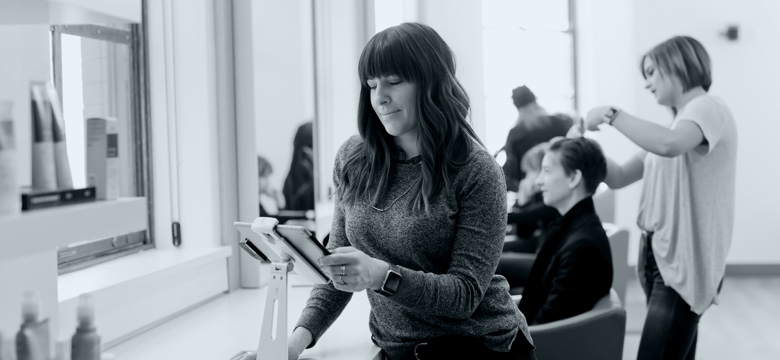Question of the day: "Do hairdryers damage your hair?"
This is a question you have probably already asked yourself, without necessarily being able to get a clear and detailed answer. Opinions on the regular use of hairdryers and their possible effects on hair health can sometimes be contradictory and it is not always easy to get an overview of the arguments and/or feedback coming at you from all sides.
As a manufacturer of professional hairdryers, we would like to give you clear and comprehensive information on the subject. So, do hairdryers damage your hair? Let us give you a detailed explanation.
Do hairdryers "damage" your hair? Only when they are not used properly!
To understand how hairdryers can damage your hair, it is important to understand how they work. Hairdryers are designed to dry hair faster than letting it dry naturally, and with the help of accessories such as brushes, combs, rollers, etc, they can be used to style your hair. But exposing your hair to blasts of air at temperatures up to 100°C is not natural, of course, and misuse can indeed have a detrimental effect on the health of your hair:
→ Hair exposed to blasts of excessive heat for too long may lose its vitality.
→ Similarly, the scalp tends to react badly to too much heat exposure; it triggers sebum production, causing the dreaded "oily roots - dry ends" effect.
→ At the end of this 1st round on the subject, "Do hairdryers damage your hair?", we can confirm that hairdryers can potentially cause damage to your hair. But is it a good idea to ban hairdryer use completely? It seems that leaving your hair to dry naturally is not the best way to keep it healthy either...
Blow-drying is not the best thing for healthy hair
If hairdryers pose a health risk to hair when used improperly, shouldn’t we just leave our hair to dry naturally? Recent studies* cast doubt on this issue: not blow-drying hair means that the hair stays wet for longer. Leaving your hair wet for prolonged periods of time has a negative impact on the deep cuticle, the protective envelope of the hair.
What tends to happen is that the water retention causes the inner part of the cuticle to swell, which leads to cracks and fissures in the protective structure of the hair, making it more fragile. Not to mention that when wet, your hair is much more exposed to the toxic effects of pollution...
*https://www.ncbi.nlm.nih.gov/pmc/articles/PMC3229938/
→ Do hairdryers damage your hair? Round 2: using a hairdryer properly is better for the hair than leaving it to dry naturally! So basically, to avoid all risk of damaging your hair, it depends on how you use the hairdryer.
First and foremost, the hairdryer is a tool
When people ask whether hairdryers damage hair or not, they tend to forget that a hairdryer is primarily a tool. And like any tool, it can work wonders if used wisely, or have a disastrous effect if used improperly.
So, whether or not a hairdryer has a detrimental effect on the health of your hair really depends on how you use it. But if you follow the advice given here, you will be able to use your hairdryer regularly - even daily - without damaging your hair.
PS: If you are concerned about a hairdryer making too much noise, our range of silent hairdryers is tailor made for you!
Do hairdryers damage you hair? NO, as long as you:
- Avoid contact between the hairdryer and your hair and/or brush. This has an immediate disastrous effect, both on your hair, your brush, and your hairdryer. Always keep a distance of at least 5 cm between the hairdryer and your hair.
2. Choose the right temperature and speed settings.
It is essential that you adjust the temperature and drying speed according to both your hair type and your experience using a hairdryer. If you're a complete novice when it comes to blow-drying, you may have to do it over and over again to get the desired effect. The problem is that repeated blow-drying, or blow-drying too slowly on the same strand, can cause immediate harm.
You should take the following points into account when blow-drying your hair:
- If you are a novice, choose the lowest heat setting and adjust the blowing speed according to the length of your hair: speed 2 for long hair, and speed 1 for short to mid-length hair.
- If you feel more confident, you can choose a higher heat setting (2 or 3, depending on your hairdryer) and, again, adjust the blowing speed to suit the length of your hair: 1 for short hair, and 2 for mid-length to long hair.
3. Choose the right type of hairbrush.
You can find a wide range of hairbrushes in shops and indeed the kind of brush you use has a real impact on how well the blow-dry turns out. We recommend you use a boar bristle brush, which is similar to human hair keratin. Since it won’t create static electricity in your hair, the blow-drying process will be a lot easier.
Note: If you often struggle with static electricity, consider getting an ionic hairdryer, as these are specifically designed to eliminate it.
4. Keep drying time to a minimum.
Don't try to make the hair bone dry; moisture is what gives hair its shine.
In conclusion: does blow-drying damage your hair? No, not if you follow your hairdryer’s operating instructions to the letter.



